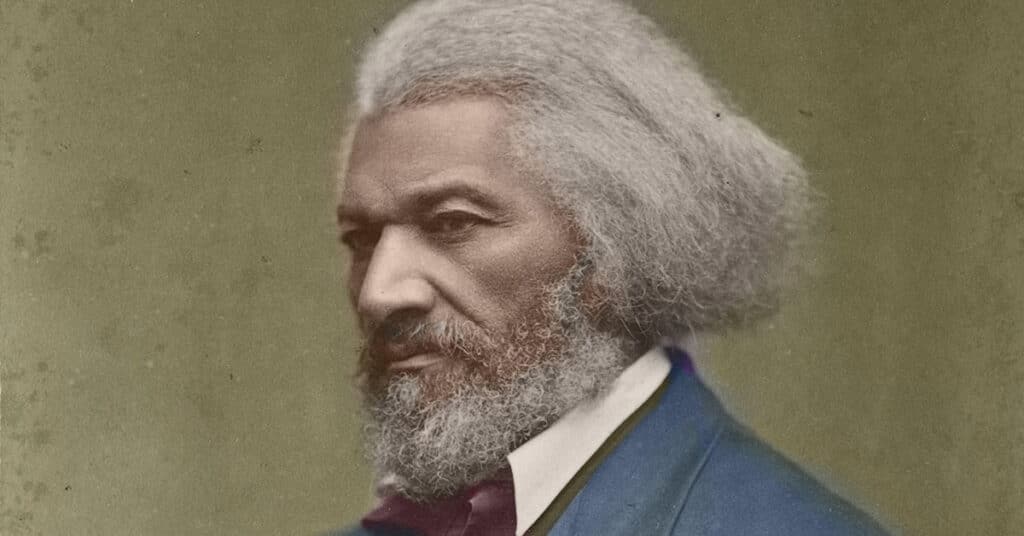Frederick Douglass (c. 1817 – 1895) was the American who is perhaps most responsible for the way we see ourselves as a “good people” and a constitutional democracy. He was both an abolitionist and supporter of women’s rights.
The Guardian of the U.S. Constitution
The founding fathers wrote beautiful words, but didn’t live up to them. Today we celebrate Abraham Lincoln for ending human slavery in the United States, but even he didn’t start out as an abolitionist.
It was the brilliant mind and tireless work of Frederick Douglass that brought the U.S. Constitution to life. Before him, it was just a piece of paper that nobody paid much attention to.
For those who don’t know, the U.S. Constitution is the top law of the United States. It supersedes all other American laws, or at least is supposed to. (Ironically, Mr. Douglass had more respect for the U.S. Constitution than many American politicians do today.)
While not perfect, the U.S. Constitution is one of the great humanitarian documents of all time. It inspired revolutions around the world including the U.S. Revolution (1775-1783), the French Revolution (1789-1789), the Haitian Revolution (1791-1804) and the revolutions that freed Latin America from European exploitation starting in 1808.
The Haitian Revolution changed American history by kicking the French out of the Caribbean. French losses forced Napoleon to sell the middle slice of America which we know as the Louisiana Purchase of 1803.
Frederick Douglass Freed Himself
Mr. Douglass was an African American who was born into human slavery in Talbot County, Maryland in 1817 or 1818. In that era, many people didn’t know exactly when they were born. Douglass chose February 14 as his birthday. The day of love is very appropriate.
He freed himself, first by teaching himself to read and write. What kind of genius does it take to do that?
Once you learn to read, you will be forever free.”
Frederick Douglass
Like many African Americans, Douglass resisted enslavement. Put under the control of a sadistic boss, he fought back, and that man never dared touch him again. Bullies put on a big show with their slogans, flags, and holy books, but the moment you fight back, they fade quickly because bullying is nothing but a mask for insecurity and weakness. There is a lesson in this. If you don’t stand up to the bully, you just get bullied more.
Mr. Douglass also educated others. He didn’t invent the saying, “Each one, teach one,” but that is how he lived. This is as important now as it ever was because uneducated people are easily manipulated.
Douglass physically freed himself by escaping to New York City in 1838. Here he was physically free, but could have been kidnapped and sold down South at any time. Most people would just disappear, but the fearless Douglass began speaking publicly about his experience and even published an autobiography, “The Life of Frederick Douglass” in 1845. He did this at great personal risk.
Douglass eventually began publishing a newspaper, “The North Star,” and toured Europe for several years. Back in the States, he published more books and continued advocating for human rights until his very last day.
Our American Self-Concept Comes From the Mind of an African American
Thinking about the great American thinkers, writers and speakers of the 1800s, Abraham Lincoln and Mark Twain come to mind, but there was someone even more important.
Frederick Douglass cut down every insult with the powerful logic of his words. His life is very well documented and his books are a great, inspiring read.
For all those who are proud to be Americans of the United States, it’s important to know that our self-concept doesn’t come from the Anglo founding fathers. It comes from an African American who freed himself – Mr. Frederick Douglass.
In a composite nation like ours, as before the law, there should be no rich, no poor, no high, no low, no white, no black, but common country, common citizenship, equal rights and a common destiny.”
Frederick Douglass

